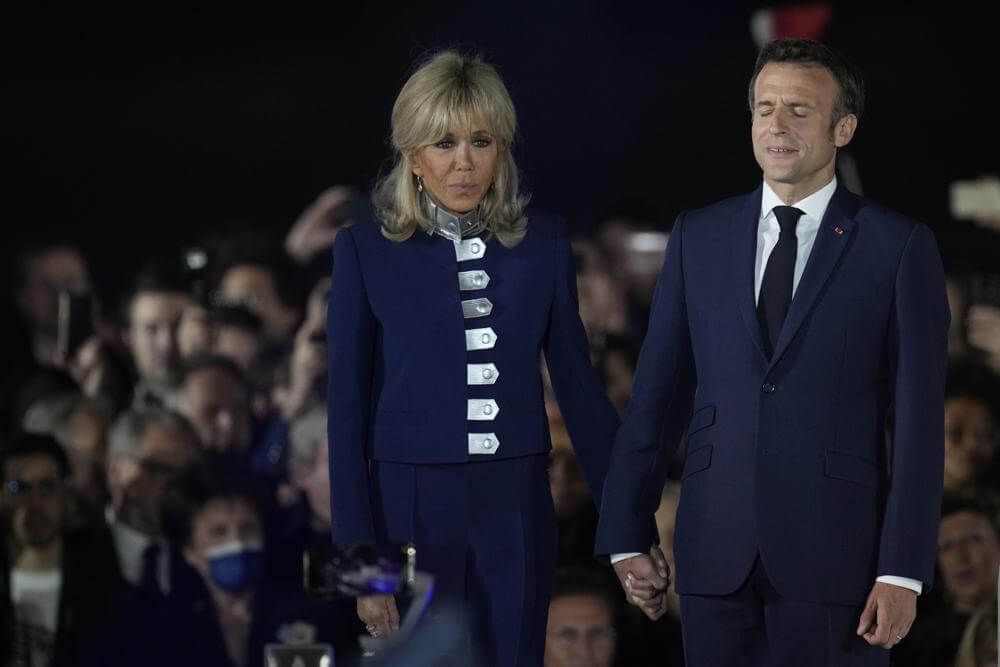Incumbent French President Emmanuel Macron emerged victorious in the second round of the country’s closely contested presidential election, securing a second term after defeating far-right rival Marine Le Pen.
According to the French Interior Ministry, Macron garnered 58.54% of the vote while Le Pen was able to secure only 41.46%. The voter turnout of 63% was the lowest in decades. Per the ministry, the turnout in 2017 and 2012 were 65% and 72%, respectively.

With the win, Macron, 44, becomes the second French president to secure re-election after Jacques Chirac beat Le Pen’s father, Jean-Marie Le Pen, in 2002. However, Macron’s win was marginal compared to the 2017 results, in which he secured 66% of the vote and Le Pen got only 34%, indicating that Le Pen’s far-right National Rally Party gained more voters.
During his victory speech in front of the Eiffel Tower, Macron vowed to unite the country by being a “President for all.” He declared that the next five years will be “historic” and that he will lead the country with “ambition and goodwill.”
La Marseillaise. 🇫🇷 pic.twitter.com/j94iGyXdyg
— Emmanuel Macron avec vous (@avecvous) April 24, 2022
“I’m not the candidate of one faction anymore, but the president for all of us,” Macron proclaimed. Acknowledging that the coming years “won’t be easy,” Macron stated that he will work together with citizens to ensure that the coming years are historic.
Addressing the far-right, Macron said that he knew they would be “disappointed” with the results but noted that he is willing to work with them to secure France’s future. “I know for a number of our compatriot that has chosen the far right today, the anger and disagreement that led them to vote for this project must get a response,” he said.
In her concession speech, Le Pen stressed that she will “continue the fight for France and the French people.” She also said that the divisions in France will only get more polarised under Macron. “I fear the next five years will not break with the contempt and the brutal policies of the last five years and Emmanuel Macron will do nothing to repair the divisions in our country,” she lamented.
“Vive la République et vive la France” or "Long live the Republic and long live France."
— Bloomberg Quicktake (@Quicktake) April 25, 2022
Emmanuel Macron defeated far-right leader Marine Le Pen in the French presidential #Elections2022 on a pro-business, pro-EU platform. He thanked his supporters https://t.co/gChSNGKg0i pic.twitter.com/MZsfxT5QdU
Le Pen stressed that she will never abandon the French people and would lead the far-right’s campaign in the parliamentary elections in June. She added that the result represents a “brilliant victory” for her supporters, as she is the only far-right leader to break the 40% threshold in France’s history.
“French people have this evening shown their desire for a strong counter-power to Emmanuel Macron,” Le Pen remarked.
Le Pen and the more centrist Macron greatly diverge on their vision for France. For instance, while Macron has expressed support for Ukraine and sent military equipment to the Ukrainian military to fend off Russia’s invasion, Le Pen has vowed to seek closer ties with Russian President Vladimir Putin if elected.
In an interview with Ma France last week, Le Pen said that pursuing closer ties with Russia was in Europe’s interest since China is the biggest threat to Europe in the near future. “It will be necessary diplomatically, when the war [in Ukraine] is over, when a peace treaty has been signed, to try to avoid this tie-up which risks being the largest danger of the 21st century for us,” she said.
Justifying her stance to maintain ties with Moscow amid the changed geopolitical situation, Le Pen asserted, “Imagine […] if we let the first producer of raw materials in the world—which is Russia—[create an alliance] with the first factory of the world—which is China—to let them perhaps constitute the first military power of the world. I believe that it’s potentially a great danger.”
Furthermore, she defended Russia’s invasion of Crimea in 2014, claiming that “Crimea was never invaded” as “there was a referendum in Crimea,” and hence, it was “radically different” from today’s war, which began on February 24.
Le Pen is also known for her stance against France remaining in the European Union (EU) and has previously advocated for leaving the bloc and dropping the Euro as France’s official currency. More recently, however, in a bid to gain additional support, Le Pen has relaxed her approach towards the EU and stressed that she would not leave the Union. Nevertheless, her National Rally party continues to strongly oppose France’s European commitments and remains deeply Eurosceptic.
Le Pen has also been vocal about curbing illegal immigration into France and has proposed to hold a referendum on tightening immigration controls. Furthermore, she has called for a public ban on wearing the hijab, leading to fears of discrimination against France’s minority Muslim population.
Congratulations to my friend @EmmanuelMacron on being re-elected as the President of France! I look forward to continue working together to deepen the India-France Strategic Partnership.
— Narendra Modi (@narendramodi) April 25, 2022
Meanwhile, Macron’s victory was welcomed by the international community. He was congratulated by Indian Prime Minister Narendra Modi, European Council President Charles Michel, United States President Joe Biden, British Premier Boris Johnson, and a host of other world leaders.

